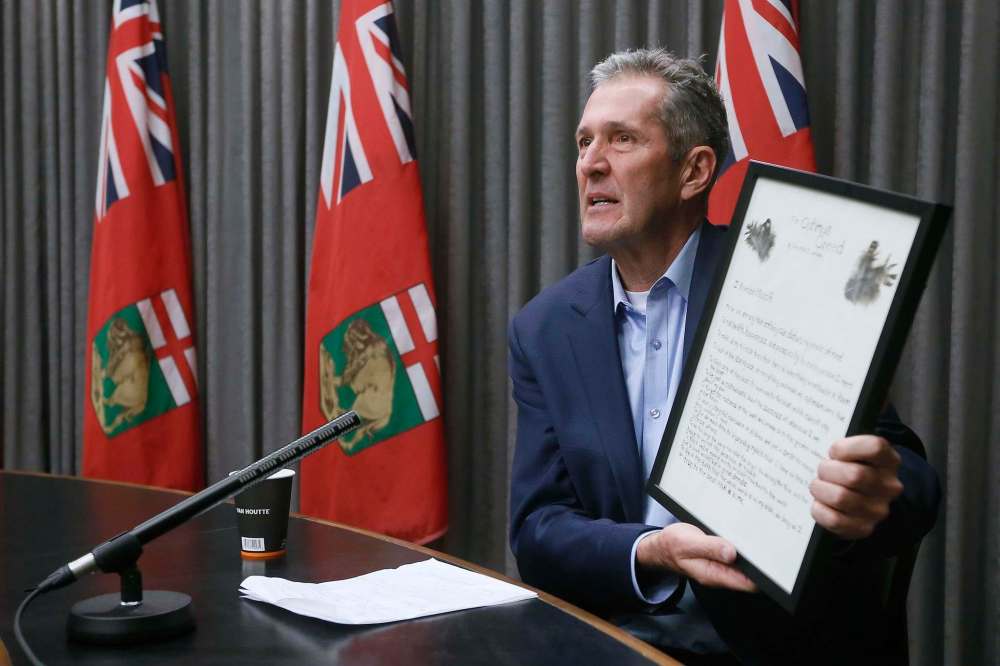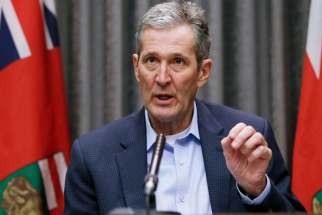Premier does little to quell our economic fears
Read this article for free:
or
Already have an account? Log in here »
To continue reading, please subscribe:
Monthly Digital Subscription
$0 for the first 4 weeks*
- Enjoy unlimited reading on winnipegfreepress.com
- Read the E-Edition, our digital replica newspaper
- Access News Break, our award-winning app
- Play interactive puzzles
*No charge for 4 weeks then price increases to the regular rate of $19.00 plus GST every four weeks. Offer available to new and qualified returning subscribers only. Cancel any time.
Monthly Digital Subscription
$4.75/week*
- Enjoy unlimited reading on winnipegfreepress.com
- Read the E-Edition, our digital replica newspaper
- Access News Break, our award-winning app
- Play interactive puzzles
*Billed as $19 plus GST every four weeks. Cancel any time.
To continue reading, please subscribe:
Add Free Press access to your Brandon Sun subscription for only an additional
$1 for the first 4 weeks*
*Your next subscription payment will increase by $1.00 and you will be charged $16.99 plus GST for four weeks. After four weeks, your payment will increase to $23.99 plus GST every four weeks.
Read unlimited articles for free today:
or
Already have an account? Log in here »
Hey there, time traveller!
This article was published 27/03/2020 (2086 days ago), so information in it may no longer be current.
It takes a rare kind of leader — whether in business or politics — to admit they have suffered from a mental health challenge. Premier Brian Pallister joined the ranks of those leaders when he admitted on Friday that at times, he has suffered from depression.
His low point took place several years ago following his mother’s death. On Friday, as the premier held a news conference to announce an online emergency mental health strategy, he took a framed copy of the Optimist’s Creed, which one of his daughters had made for him to help ease the burden of his loss. He made his admission, and showed his framed creed, to set the table for the new online tool.
Manitobans who are 16 or older will be able to access mental health professionals through an online portal without a doctor’s referral. Manitoba is the first province to offer this kind of online mental health support. But even with his deeply personal admission, the pledge to provide emergency online mental health services was awkward and, at times, bizarre.

Pallister’s announcement came less than an hour before public health officials confirmed Manitoba’s first death from COVID-19. The premier has typically done a media availability following the daily COVID-19 briefing from public health officials. On Friday, however, he decided to pre-empt the tragic news of Manitoba’s first virus-related death with what he described as a “good news story.”
Manitoba has, thankfully, not experienced the high infection rates or death toll experienced in other jurisdictions. But that first death is a seminal moment in the battle against the virus, and it was odd to have it confirmed after the premier tried to raise everyone’s hopes with his mental health announcement.
Journalists and commentators trying to wrap their minds around the pandemic have been wearing out a quote from Eric Walters, a prolific Canadian author of young adult fiction. Walters wrote that “crisis doesn’t change people; it reveals them.” Although our premier still has an opportunity to show people he is the right man for the current crisis, there is little doubt the pandemic is revealing some of his limitations.
We are all suffering from an overload of fear and anxiety.
Chief among them is a chronic and intractable stubbornness. We saw that this week when — after weeks of absorbing pointed criticism — he abandoned his plan to further cut the provincial sales tax at a time when the provincial treasury is clearly going to be depleted. Only a leader with a robust-bordering-on-blind confidence in his own judgment would have waited so long before changing course.
That same stubbornness is on display in Pallister’s continuing refusal to do more to help ease the economic disruption caused by the crisis, a problem that is no doubt at the heart of many of the mental health problems the premier is trying to address.
We are all suffering from an overload of fear and anxiety.
There is fear that we or our families or friends will catch the virus. For the most part, Pallister and the province’s public health officials are doing what they need to do. We are screening, testing and treating as many potentially ill people as possible, while severely restricting the movements of healthy people to stop the spread of the virus. Although there have been some rough spots, for the most part this aspect of the government’s response has been more than adequate.
But there are a range of other concerns related to the economy. For those who have lost their jobs, fear comes from the uncertainty about being able to pay basic bills and protect their families. For those who still have jobs, it is the fear of uncertainty about the future. Again, while Manitoba has, so far, escaped the worst of the public health problems, we are in lock-step with the rest of the country in terms of economic disruption.
Despite that, Pallister continues to demonstrate a stoic reluctance to directly help the economically displaced, arguing the federal government should be the first source of support.
Despite that, Pallister continues to demonstrate a stoic reluctance to directly help the economically displaced, arguing the federal government should be the first source of support.
Manitoba’s support has been limited to a freeze on evictions and rent increases, payment deferral of some provincial taxes, and additional money to subsidize daycare for essential health care workers. Meanwhile, just about every other province has introduced its own measures to augment or improve federal programs. The other provinces are providing basic income support for the unemployed or underemployed, financial aid for food banks, and programs to sustain businesses that have had to close due to public health directives.
To be fair, the online mental health supports are not unwelcome; a free, direct route to a therapist will no doubt help a lot of people. But this is not an antidote for the stress that is keeping Manitobans up at night.
Introducing the mental health portal right before public health officials confirmed the first COVID-19 death was clumsy and politically tone-deaf. It’s like unveiling a new government program to buy smoke detectors just before a news conference where we find out all the houses are on fire.
The province has done a lot of positive and constructive things in its response to the outbreak and the premier should share in the credit. But that is only half of the job at hand. Premiers have to protect everyone from economic collapse.
Protecting people from economic disruption doesn’t require a 24-hour-a-day online portal. It just requires some political will.
dan.lett@freepress.mb.ca

Born and raised in and around Toronto, Dan Lett came to Winnipeg in 1986, less than a year out of journalism school with a lifelong dream to be a newspaper reporter.
Our newsroom depends on a growing audience of readers to power our journalism. If you are not a paid reader, please consider becoming a subscriber.
Our newsroom depends on its audience of readers to power our journalism. Thank you for your support.







